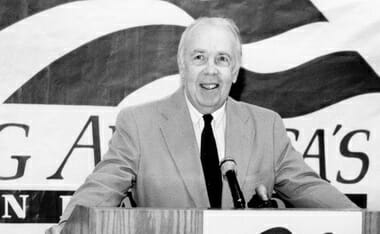Originally Posted: Aug 28, 2013
More on Alger Hiss via WND:
Former U.S. State Department official Alger Hiss was the darling of the Franklin Roosevelt Democrats and the architect of the United Nations.
That he was also a Soviet spy remains one of the most well-guarded secrets of the 20th century.
But a new book, “Alger Hiss: Why He Chose Treason,” shatters the veil of secrecy so well maintained by “progressives” in the Democratic Party and a complicit media establishment.
It all began unraveling in 1948, when Hiss was accused of being a Soviet spy. Because the statute of limitations on espionage had run out, he was convicted only of perjury. Decades later – after the Hiss trial had been long forgotten by most – archival evidence surfaced confirming the accusations: a public servant with access to classified documents had indeed passed crucial information to the Soviets for more than a decade.
Yet many on the American Left still consider Hiss an iconic figure – an innocent victim accused of unsubstantiated crimes. They prefer to focus on the collectivist ideals Hiss stood for, rather than confront the reality of a man who systematically and methodically betrayed his country.
[….]
Why exactly were the intellectual elite so determined that Hiss was innocent? His accuser, Time magazine senior editor Whittaker Chambers – originally Hiss’s Soviet handler and author of the classic “Witness” – presented compelling written evidence. However, the intelligentsia were intent on supporting one of their own. They ignored the facts, a willful blindness that helped contribute to a polarization still in place in our country today.
Thirty years of intelligence analysis gives Shelton the expertise to approach the story from many different angles, especially:
- Her persuasive argument that communism and fascism are not polar opposites, as has so long been claimed, but highly similar ideologies.
- How Hiss’s central role at the Yalta Conference and the founding of the United Nations are examples of the significance of Soviet intelligence recruitment of high-level Americans who could influence U.S. foreign policy in their favor.
- Why the silence surrounding the implications of Hiss’s espionage continues—and why apologists fear that smearing his name would undercut New Deal policies and the United Nations. Shelton doesn’t just detail the body of evidence pointing to Hiss’s guilt; she suggests new layers of meaning in light of the current political landscape……
Julius and Ethel Rosenberg
The stroy about the Rosenbergs saw new light when the two sons of the Rosenbergs asked Obama to exonerate their mother (NEWSMAX). The AMERICAN THINKER notes the continued Lefty accolades of Ethel…
In its latest fit of leftist madness, the City of New York again displayed its colors when its City Council enacted a resolution honoring convicted and executed spy Ethel Rosenberg on the centenary of her birth. The council declared September 28 “Ethel Rosenberg Day of Justice in the Borough of Manhattan.”
The council’s proclamation heralded Ethel for her “great bravery” and asserted that she had been “wrongfully” executed for joining her husband Julius in giving atomic secrets to Stalin’s Soviet regime. “A lot of hysteria was created around anti-communism and how we had to defend our country,” lamented Councilman Daniel Dromm, “we rushed to judgment and they [the Rosenbergs] were executed.” Manhattan Borough President Gale Brewer added her regrets, condemning this “terrible stain on our country.”
There could scarcely be a more apt gesture from a city that long housed the Communist Party USA, the Daily Worker, and Columbia University. New York was home to more communists than any city in America, and its current mayor, Democrat Bill De Blasio, once peddled subscriptions for the newspaper of the Marxist Sandinistas in Nicaragua before later honeymooning in Castro’s Cuba — a decade after his earlier romance in the Soviet Union…..
Here is an old one pager (2005) I wrote regarding the Rosenbergs… followed by an excerpt about them from another post:
WERE THEY SPIES? Julius and Ethel Rosenberg
The Rosenbergs are often pointed to as an example of the government being too overbearing. And people on the political left – more often than not – take this position in public discourse. Often it has imbued in the premise of the Rosenberg’s illusions to the McCarthy era as well as a disdain for the political right.
However, in recent years many documents have been declassified, and these documents along with a plethora of once secret documents from the now defunct U.S.S.R. show that not only McCarthy, but also others who saw a Marxist conspiracy were actually right in their investigations. In fact, these documents from Russia and the KGB show the problem was worse than McCarthy had thought! As one author put it: “McCarthy was making a good point badly.”
Case in point: the Rosenbergs (4-points of rebuttal):
- In 1995 the government declassified the Venona cables, which proved definitively that Julius and Ethel were part of a sophisticated network of communist traitors.
- And if the Venona messages weren’t enough, Aleksander Feklisov, the former KGB colonel, really sealed the deal. While Venona was comprised of documents decoded by American cryptanalysts, no messages from the KGB itself proved the Rosenbergs’ guilt. But then Feklisov, who personally handled the Rosenberg case, admitted that he recruited Julius to spy for the U.S.S.R. in 1943. Feklisov and Julius had fifty meetings, and Julius gave Feklisov valuable military information. Further, Feklisov said that Ethel knew about her husband’s spying. (Incidentally, the KGB’s codename for Julius was ”Liberal.”)
- The evidence does not end here. In 1990 Nikita Khrushchev published his memoirs in which he praised the Rosenbergs for their ”very significant help in accelerating the production of our atomic bomb.”
- Additionally, during the Rosenbergs’ trial, the defense—that is, the people who were trying to keep the Rosenbergs’ Red flesh off the electric chair—asked the media to leave the courtroom while David Greenglass, the guy who had allegedly fed Julius and Ethel the secret information, detailed to the court what he had shared with the accused. If Greenglass hadn’t broken the law, and if, therefore, the Rosenbergs hadn’t, why would reporters have to leave?
Two books that are a good read:
- Blacklisted by History: the Real Story of Joseph McCarthy and the Fight Against America’s Enemies, by M Stanton Evans.
- The Venona Secrets: Exposing America’s Cold War Traitors, by Herb Romerstein.
Here is that excerpt from my: “Howard Zinn (1922-2010) Passing From This Hell To The Next“
Which causes one to ask JUST HOW GOOD is Zinn’s historical “narrative” from his Marxist “red colored glasses”? Reason.com asks the same question, “JUST HOW POOR IS ZINN’S HISTORY?“
They then answer it:
…After hearing of his death, I opened one of his books to a random page (Failure to Quit, p. 118) and was informed that there was “no evidence” that Muammar Qaddafi’s Libya was behind the 1986 bombing of La Belle Discotheque in Berlin. Whatever one thinks of the Reagan administration’s response, it is flat wrong, bordering on dishonest, to argue that the plot wasn’t masterminded in Tripoli. Nor is it correct to write that the American government, which funded the Afghan mujahadeen in the 1980s, “train[ed] Osama bin Laden,” a myth conclusively debunked by Washington Post correspondent Steve Coll in his Pulitzer Prize-winning book Ghost Wars.
Of Cuba, the reader of A People’s History is told that upon taking power, “Castro moved to set up a nationwide system of education, of housing, of land distribution to landless peasants.” Castro’s vast network of gulags and the spasm of “revolutionary justice” that sent thousands to prison or the executioners wall is left unmentioned. This is unsurprising, I suppose, when one considers that Zinn recently told an interviewer “you have to admire Cuba for being undaunted by this colossus of the North and holding fast to its ideals and to Socialism….Cuba is one of those places in the world where we can see hope for the future. With its very meager resources Cuba gives free health care and free education to everybody. Cuba supports culture, supports dance and music and theatre.”
There is also no mention of the Khmer Rouge or Pol Pot, though in a misleading digression into the so-called Mayaguez Incident, Zinn mentions that “a revolutionary regime had just taken power” in Cambodia and treated its American prisoners rather well. And it is untrue, as Zinn claims, that President Gerald Ford knew Cambodia had released its American captives in 1975 but still allowed a small Marine invasion simply to show American muscle after the Vietnam humiliation.
A People’s History is full of praise for supposedly forgotten truth-tellers like “Dalton Trumbo and Pete Seeger, and W.E.B. Du Bois and Paul Robeson,” all apologists for Stalinism. (Both Du Bois and Robeson were awarded the Stalin/Lenin Peace Prize by the Kremlin, and both enthusiastically accepted.) There is no accounting of communism’s crimes, though plenty of lamentations that, after the Second World War, “young and old were taught that anti-Communism was heroic.” Indeed, in the comic book version of A People’s History, Zinn writes that the Cold War “would last for over 40 years” but “to keep it going required political and social repression on both sides” (emphasis in original).
Despite conclusive evidence from Russian archives, Zinn suggests the atom spies Morton Sobel and Julius Rosenberg were railroaded with “weak” evidence and their subsequent trials were simply to show “what lay at the end of the line for those the government decided were traitors.” When Sobel confessed his espionage to the The New York Times earlier this year, Zinn told a reporter, “To me it didn’t matter whether they were guilty or not.”
This is a strange sentiment for someone whose job, one assumes, is to mine the historical record in search of historical truth. But Zinn wasn’t, as Schlesinger correctly said, a historian in any traditional sense. Zinn abjured footnotes (there are a number of quotes in A People’s History that I couldn’t verify), his books consist of clip jobs, interviews, and recycled material from A People’s History, and he was more likely to be found protesting on Boston Common than holding office hours at Boston University. But it is clear that those who have praised his work do so because they appreciate his conclusions, while ignoring his shoddy methodology.
This helps explain why few of his acolytes mention the effusive blurbs Zinn provided for David Ray Griffin’s two books of 9/11 conspiracy theories, Debunking 9/11 and The New Pearl Harbor, or why A People’s History uses the work of Holocaust denier David Irving to inflate the civilian death toll at Dresden….
They end this “eulogy” with this thought, “Call him what you will—activist, dissident, left-wing muckraker. Just don’t call him a historian.”

